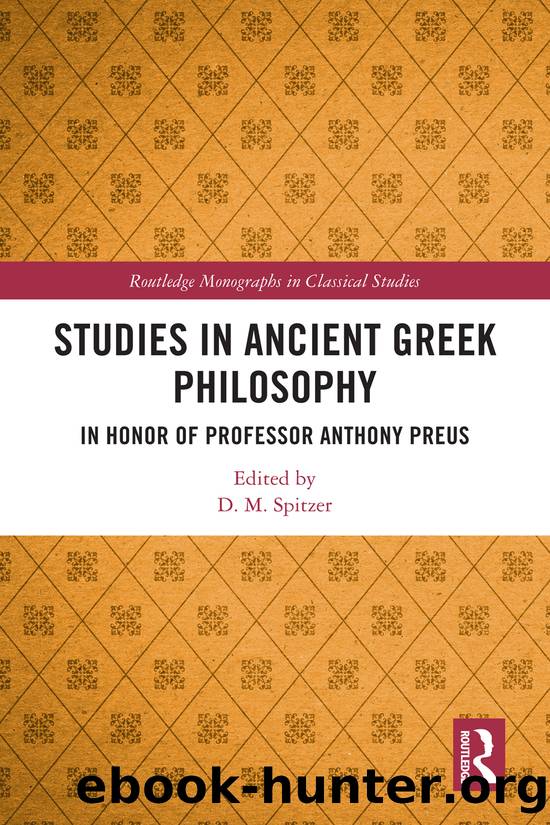Studies in Ancient Greek Philosophy by D. M. Spitzer;

Author:D. M. Spitzer;
Language: eng
Format: epub
ISBN: 9781000845204
Publisher: Taylor & Francis (Unlimited)
Published: 2023-01-12T00:00:00+00:00
Notes
All translations of Plato are from Cooper and Hutchinson (1997).
Presumably, the Spirited faculty, too, is subject to some persuasion and education.
In this essay, the name Socrates refers exclusively to the character in Platoâs dialogues. I take it that this dramatic figure represents, among other things, the philosopher or the practice of philosophy enacted by someone whose soul is justly governed by reason.
The autonomy of reason (λογιÏÏικÏν) seems essential to knowing. Witness to this is Socratesâ insistence that his teaching is maieutic (Tht. 149aâ151d) added to the claim that the most courageous and wisest of souls is the one least liable to be altered by external influences (Resp. 381a).
Socrates describes Theaetetusâ restlessness about his inability to define knowledge, his ignorance in the matter, not as an emptiness but as a pregnancy (Tht. 148e). Recollection also points to the desire to know arising from fullness, as does Diotima (Symp. 206e).
Resp. 434dâ445e and most of the text after the division becomes part of the search for justice.
âYet, surely, the story [of Leontius] suggests that anger sometimes makes war against the appetites as one thing against anotherâ (Resp. 440aâb; my interpolation).
It is worth noting that the examples show strong links between the desiring elements, i.e., reasonâs self-harm co-opts the appetites and/or Î¸Ï Î¼ÏÏ.
Notice the caveat: âAnd if there turn out to be any intervening elementsâ¦â (Resp. 443e). The comment invites dialogue and inquiry about the division of the soul.
My sense is that when either Parmenides or a Stranger directs the inquiry, readers can observe Î½Î¿á¿¦Ï at work. Socrates points to the work of Î½Î¿á¿¦Ï when he introduces dialectic, the method through which thinking looks to Î½Î¿á¿¦Ï for justification.
Consider, for example, Cephalus in Book I of the Republic. There are very few appetite-driven interlocutors. I suspect that is the case because reason speaks directly to spiritedness which in turn brings the appetites along.
âRecognizing his fighting spirit and his excitement, I asked him: âSo what is that to you? Has Protagoras done anything wrong to you?ââ (Prt. 310d).
Protagorasâ conduct brings to mind the description of a sophist in Theaetetus, as someone who âwould keep on refuting you and not let you go till you had been struck with wonder at his wisdomâ¦.â (Tht. 165dâe).
Socrates personifies arguments in other dialogues, i.e., Tht. 191a; in Cri. 50aâ54d Socrates both personifies and impersonates the laws of Athens.
For example, the Charmides inquires into moderation, the Laches and the Protagoras into courage, and the Republic into justice as well as all the other virtues.
On Prodicusâ art of division and the famous story of Heraklesâ choice, see Xen. Mem. 2.1.21â23.
See Scodel (2010, 56â71). See also Scott (2013).
Ap. 30aâb identifies that mission to involve bringing others to care about virtue.
Menoâs responses have implications both for knowledge and for virtue. A discussion of each definition would take us far afield and what next needs our consideration is how Socrates proceeds in seeking to educate a spirited person whose reason is saturated by teachings. The debaterâs argument and the myth of recollection amply show Socrates at work and the power that reason has to educate and release from tyranny an uneducated soul.
Download
This site does not store any files on its server. We only index and link to content provided by other sites. Please contact the content providers to delete copyright contents if any and email us, we'll remove relevant links or contents immediately.
| Central Africa | East Africa |
| North Africa | Southern Africa |
| West Africa | Algeria |
| Egypt | Ethiopia |
| Kenya | Nigeria |
| South Africa | Sudan |
| Zimbabwe |
Goodbye Paradise(2971)
Men at Arms by Terry Pratchett(2408)
Tobruk by Peter Fitzsimons(2064)
Pirate Alley by Terry McKnight(1910)
Arabs by Eugene Rogan(1837)
Borders by unknow(1789)
Belonging by Unknown(1472)
The Biafra Story by Frederick Forsyth(1325)
It's Our Turn to Eat by Michela Wrong(1305)
Botswana--Culture Smart! by Michael Main(1238)
A Winter in Arabia by Freya Stark(1225)
Gandhi by Ramachandra Guha(1196)
Coffee: From Bean to Barista by Robert W. Thurston(1183)
Livingstone by Tim Jeal(1152)
The Falls by Unknown(1142)
The Source by James A. Michener(1135)
The Shield and The Sword by Ernle Bradford(1101)
Egyptian Mythology A Fascinating Guide to Understanding the Gods, Goddesses, Monsters, and Mortals (Greek Mythology - Norse Mythology - Egyptian Mythology) by Matt Clayton(1088)
Africa: Altered States, Ordinary Miracles by Richard Dowden(1078)
